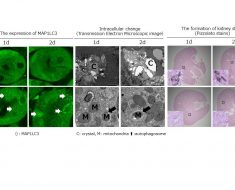Point-of-care testing developed at Flinders University will be part of the rollout of new services targeting infectious diseases across remote Australia and also the Asia-Pacific.
The Flinders University International Centre for Point-of-Care Testing team, led by Professor Mark Shephard at Flinders University’s College of Medicine and Public Health, is a co-chief investigator in the new five-year $2.49 million collaborative Centre for Research Excellence (CRE) focusing on scaling up new point-of-care (POC) diagnostic technologies for infectious diseases of global importance, including HIV, hepatitis C, tuberculosis, HPV and STIs.
Led by Professor Rebecca Guy at the University of NSW Kirby Institute, the CRE announced by the Australian Government’s National Health and Medical Research Council (NHMRC) will investigate POC tests to enable infectious disease testing and treatment to be provided on the same day.
It will take place across 300 primary health care services in Australia, Papua New Guinea, Vietnam and Indonesia.
The so-called ‘CRE in the accelerated implementation of new POC technology for infectious diseases’ includes researchers from the Kirby Institute, Flinders University, University of NSW Sydney, the SA Health and Medical Research Institute (led by SAHMRI and Flinders University Matthew Flinders Associate Professor James Ward), University of Queensland and Sydney University.
SAHMRI and Flinders University Associate Professor Ward leads extensive research and engagement with Aboriginal and Torres Strait Islander communities on public health issues, including viruses and sexually transmitted infections (STIs). He collaborates with a network of researchers, government and Aboriginal community health organisations in studies such as STRIVE, a cluster randomised trial of quality improvement in 67 remote communities and TTANGO, a randomised trial of chlamydia and gonorrhoea POC testing in remote Aboriginal communities.
In Australia POC testing supports hard-to-reach patients, including Indigenous communities in rural and remote communities, where long distances, staff turnover, and social and cultural factors can prevent individuals returning to a clinic for a follow up visit, meaning that infectious diseases can often be left untreated.
“Our previous work in this area has shown that POC testing in primary care works to improve infectious disease diagnosis in remote Aboriginal communities in Australia, and the CRE collaboration is well placed to scale up this method in other settings in Australia and our region,” Professor Guy says.
In the Asia-Pacific, POC tests are recommended, but uptake remains low in many countries, due to a range of other barriers. This project will leverage clinical networks of over 300 primary health care services in the Asia-Pacific region.
“This project will break down barriers to treatment access, ultimately leading to major reductions in the associated illnesses, and improvements in the overall health of these communities.”
Professor Shephard says the Flinders University International Centre for Point-of-Care Testing “is pleased to continue our collaborative work with Professor Guy and the Kirby Institute team through the new CRE”.
Source: Read Full Article





